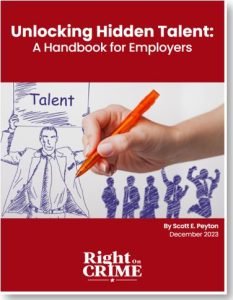|
One who cares must meet the cared-for just as he or she is, as a whole human being with individual needs and interests.
- Nel Noddings
|
Employers
 You have the opportunity to help create one of the first and most stable bridges to reentry success. Fair Shake supports an employer’s desire to understand formerly incarcerated applicants by offering tools for our members to more fully demonstrate their character than may be available on a standard job application.
You have the opportunity to help create one of the first and most stable bridges to reentry success. Fair Shake supports an employer’s desire to understand formerly incarcerated applicants by offering tools for our members to more fully demonstrate their character than may be available on a standard job application.
Did you know that support is also available to you through bonding programs and tax incentives? We have included that information, too.
.
Fair Shake Employer Support Guide
A one-page flyer with information and incentives for hiring the formerly incarcerated.
NEW! Right On Crime Employer Handbook:
Unlocking Hidden Talent
Research and studies point out that individuals with criminal backgrounds are very often loyal and dedicated employees.
Why Hire a Formerly Incarcerated Person?
- To find the best fit for your company!
- They are often trained and motivated

- May have job coach or advisor
Michigan Public Radio Interview
Cascade Engineering Encourages Employers to Hire the Formerly Incarcerated
Interview with the company’s vice president, Kenyatta Brame, and Jahaun McKinley, formerly incarcerated and lean manager at Cascade who has been with the company for six years.
Economic Incentives
Bonding
Directory of State Bonding Coordinators
Work Opportunity Tax Credit
Fair Shake applauds these states for banning the box in the private sector:
|
and Washington D.C. |
Hawaii |
|
 Fair Shake Personal Web Page
Fair Shake Personal Web Page
The power of the Personal Web Page: understanding your applicant
What it shows you:
Ownership
Initiative
Character
Computer Skills
National Hire Network
We offer smart solutions to employers to help them access qualified workers, protect themselves from negligent hiring concerns, and maximize cost-savings. We provide peer-to-peer exchange of ideas and innovative practices that can be utilized in your community or state.
Funding Employee Training
Did you know you might qualify for state or federal grants to help you train your employees? Find information here.
State and Federal Grants
Your business may be eligible for a state or federal training grant (or other funding). Learn more through your local Workforce Investment Board, Small Business Development Center, or economic development agency.
State and Local Grants
When exploring grants or other funding for training, start at the state or local level. Here are some options for getting started:
- Find your local Workforce Investment Board. Ask about training grants and other funding and get help with the application process.
- Locate your nearest Small Business Development Center (SBDC) and ask about a free consultation to discuss your training needs.
Work Opportunity Tax Credit
This federal tax credit offers funds to train new hires who meet certain requirements.
On the Job Training (OJT)
Need skilled workers? On-the-Job Training (OJT), a federal program funded by the Workforce Investment Act (WIA), lets you hire and train skilled workers and get reimbursed for your efforts.
As an employer, you’ll benefit from more efficient recruiting, more targeted training, and assistance with training expenses
Labor Apprenticeship Program
PURPOSE: To stimulate and assist industry in developing and improving apprenticeship and other training programs designed to provide the skilled workers needed to compete in a global economy.
DESCRIPTION: Apprenticeship is a combination of on-the-job training and related classroom instruction in which workers learn the practical and theoretical aspects of a highly skilled occupation. Apprenticeship programs are sponsored by joint employer and labor groups, individual employers, and/or employer associations.
FOR FURTHER INFORMATION: Write or call the OA State Offices
or the Career One Stop Center near you:
Equal Employment Opportunity Commission Guidelines
Rights and Responsibilities of Employers
 The federal Equal Employment Opportunity Commission (EEOC) has created Enforcement Guidance on Consideration of Arrest and Conviction Records in Employment Decisions Under Title VII of the Civil Rights Act of 1964.
The federal Equal Employment Opportunity Commission (EEOC) has created Enforcement Guidance on Consideration of Arrest and Conviction Records in Employment Decisions Under Title VII of the Civil Rights Act of 1964.
Read the full report here: http://www.eeoc.gov/laws/guidance/arrest_conviction.cfm
Highlights from the report:
- Federal EEOC laws prohibit employers from discriminating when they use criminal history information, except where the nature of the conviction may relate to the nature of the position, and including consideration of the time that has elapsed since conviction.
- The Guidance discusses the differences between arrest and conviction records; the fact of an arrest does not establish that criminal conduct has occurred.
- When asking questions about criminal records, limit inquiries to records for which exclusion would be job related for the position in question and consistent with business necessity.
- Identify essential job requirements and the actual circumstances under which the jobs are performed, then determine if there are specific offenses that may demonstrate unfitness for performing such jobs.
For more information:
Pre-Employment Inquiries and Arrest & Conviction http://www.eeoc.gov/laws/practices/inquiries_arrest_conviction
Arrest and Conviction Records FAQ: http://www.eeoc.gov/eeoc/newsroom/wysk/arrest_conviction
Background checks: http://www.eeoc.gov/laws/practices/background_checks.cfm
EEOC Enforcement Guidance http://www.eeoc.gov/laws/guidance/arrest_conviction.cfm





